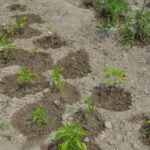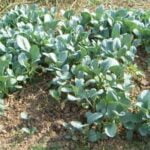Milky Spore is a popular and effective method for controlling Japanese beetle grubs in lawns. However, many vegetable gardeners are hesitant to use this product due to concerns about its safety in proximity to edible crops. In this article, we will explore the safety of Milky Spore in vegetable gardens and address common misconceptions about its usage.
Milky Spore is a naturally occurring bacterium, Bacillus popilliae, that specifically targets and eliminates Japanese beetle grubs. These grubs are a notorious pest that can cause significant damage to lawns and gardens by feeding on the roots of plants. By applying Milky Spore to your lawn or garden, you can significantly reduce the population of these pests without harming beneficial insects or other wildlife.
One of the main benefits of Milky Spore is its selective nature. Unlike chemical pesticides that can harm a wide range of insects, including beneficial ones like pollinators and predatory insects, Milky Spore only affects the larvae of Japanese beetles. This makes it an environmentally friendly option for controlling this specific pest without causing harm to other organisms within your garden ecosystem.
In the following sections, we will delve deeper into the benefits of Milky Spore, examine its effects on vegetable crops, provide guidelines for safe usage in vegetable gardens, discuss potential risks and precautions associated with its application, explore alternative organic methods for controlling Japanese beetles, and share testimonials from vegetable gardeners who have successfully used Milky Spore.
By the end of this article, you will have a comprehensive understanding of whether or not Milky Spore is safe for use in your own vegetable garden.
Understanding the Benefits of Milky Spore
Milky Spore is a natural bacterium called Bacillus popilliae that specifically targets and eliminates Japanese beetle grubs, the larvae of Japanese beetles. These voracious pests can cause significant damage to lawns and gardens by feeding on the roots of plants. Milky Spore works by infecting the grubs with spores, which then reproduce inside the larvae, leading to their death.
One of the key benefits of using Milky Spore is its selective nature in targeting Japanese beetle grubs while sparing other beneficial insects. Unlike chemical pesticides that can harm a wide range of insects, including pollinators like bees and butterflies, Milky Spore specifically targets Japanese beetle grubs. This targeted approach ensures that beneficial insects are not harmed during the application of Milky Spore.
Furthermore, Milky Spore has no adverse effects on earthworms, which are an essential component of healthy soil ecosystems. Earthworms play a crucial role in improving soil structure and nutrient availability for plant growth. The safety of Milky Spore for earthworms makes it an environmentally-friendly option for controlling Japanese beetle grubs in lawns and gardens.
Research studies have demonstrated that Milky Spore does not harm ladybugs or other predatory beetles that feed on pest insects. This is particularly important as these predatory beetles help keep populations of harmful insects under control naturally. By choosing to use Milky Spore instead of chemical insecticides, gardeners can support a healthier ecosystem and maintain a balanced insect population in their gardens.
The Role of Environmental Conditions
While Milky Spore is safe for beneficial insects when used correctly, it’s crucial to consider environmental conditions during application. The efficacy of Milky Spore depends on several factors such as soil temperature and moisture levels, which can vary depending on location and time of year.
For optimal results, it’s recommended to apply Milky Spore when soil temperatures are above 60 degrees Fahrenheit (15 degrees Celsius) and to moisten the soil before and after application. These conditions help create a favorable environment for the spores to establish themselves and multiply, improving their effectiveness in controlling Japanese beetle grubs.
The Impact on Non-Target Organisms
While Milky Spore is selective in its targeting of Japanese beetle grubs, it’s important to note that it may not be entirely harmless to all non-target organisms. Some studies suggest that certain beneficial nematodes might be affected by Milky Spore applications. However, the extent of these effects and their potential impact on overall ecosystem balance remain areas of ongoing research.
As with any pest control method, it’s essential to evaluate the potential risks and benefits before applying Milky Spore or any other product in vegetable gardens. Understanding the specific needs and characteristics of your garden ecosystem can help you make informed decisions about whether Milky Spore is suitable for your vegetable garden or if alternative methods should be considered.
Exploring the Safety of Milky Spore in Vegetable Gardens
Milky Spore is a popular method for controlling Japanese beetle grubs in lawns, but many vegetable gardeners may be hesitant to use it due to concerns about its safety. In this section, we will address some common concerns and misconceptions about using Milky Spore in proximity to vegetable crops.
One of the main misconceptions is that Milky Spore may harm beneficial insects. However, studies have shown that Milky Spore specifically targets Japanese beetle grubs and does not pose a threat to other beneficial insects such as bees, ladybugs, or butterflies. This makes it a safe option for controlling Japanese beetles without disrupting the ecological balance of your vegetable garden.
Another concern is whether applying Milky Spore near vegetable crops can contaminate them or affect their growth, health, or taste. It’s important to note that Milky Spore primarily affects the larval stage of the Japanese beetle and has no direct impact on mature plants or their produce. Therefore, when applied according to the recommended instructions, it should not interfere with the growth or taste of your vegetables.
To ensure the safe use of Milky Spore in vegetable gardens, here are some guidelines to follow:
- Apply Milky Spore according to the recommended dosage and timing specified on the product label.
- Keep a distance between the application areas and any edible parts of your vegetable plants.
- Avoid applying Milky Spore directly onto leaves or fruits.
- Water your vegetable garden after applying Milky Spore to help it settle into the soil.
By following these guidelines, you can effectively control Japanese beetle grubs without compromising the safety of your vegetable crops.
Examining the Effects of Milky Spore on Vegetable Crops
Milky Spore is a commonly used method for controlling Japanese beetle grubs in lawns, but many vegetable gardeners hesitate to use it due to concerns about its effects on their crops. In this section, we will examine whether the application of Milky Spore can potentially affect the growth, health, or taste of vegetables in a garden.
One of the main advantages of using Milky Spore is that it specifically targets the larvae of Japanese beetles and does not harm beneficial insects or other organisms in the soil. This means that the overall health and biodiversity of your garden should not be negatively impacted by the presence of Milky Spore. Additionally, since Milky Spore is a naturally occurring bacterium (Bacillus popilliae), it does not leave any harmful residue on plants or in the soil.
Studies have shown that the application of Milky Spore does not directly affect vegetable crops. It primarily stays within the soil and grub populations, targeting only these pests. However, it is important to note that proper application techniques should be followed to ensure effectiveness without inadvertently contacting edible parts of plants during treatment.
| Effect | Description |
|---|---|
| Growth | Milky Spore does not have any significant impact on growth as it primarily focuses on eliminating Japanese beetle grubs in the soil. |
| Health | The application of Milky Spore should not negatively affect the overall health or vitality of vegetable crops. |
| Taste | No noticeable changes in taste have been reported by vegetable gardeners who have used Milky Spore. |
Overall, based on available research and testimonials, the application of Milky Spore is unlikely to affect the growth, health, or taste of vegetable crops in a garden. Gardeners can be confident in using this method for Japanese beetle control without compromising the quality of their harvest. However, it is still important to follow proper application guidelines and consider other factors such as soil composition and plant species when incorporating Milky Spore into your vegetable garden.
Guidelines for Using Milky Spore in Vegetable Gardens
Timing
When using Milky Spore in your vegetable garden, timing is crucial for its effectiveness. The best time to apply Milky Spore is during the late summer or early fall when the Japanese beetle grubs are actively feeding on roots. This allows the spores to infect the grubs and spread throughout the soil. Avoid applying Milky Spore during periods of drought or heavy rain, as it may reduce its efficacy.
Application
To ensure even distribution of Milky Spore in your vegetable garden, it is important to follow the recommended application rates provided by the manufacturer. Typically, one teaspoon of Milky Spore powder should be applied per four square feet of garden area. Use a spreader or a shaker container to evenly disperse the powder over the soil surface.
After application, lightly water the area so that the spores can penetrate into the soil where Japanese beetle grubs reside. It is essential to keep the treated area moist for several months after application to facilitate spore activation and spread.
Maintenance
In order to maintain an effective population of Milky Spore in your vegetable garden, it is important to limit the use of chemical pesticides that could harm beneficial insects such as bees and earthworms which aid in spreading the spores naturally throughout your garden.
Regular maintenance practices like removing dead plant material, raking leaves, and aerating the soil can also help create an environment favorable for spreading Milky Spore naturally.
Additionally, avoid tilling or disturbing areas of your vegetable garden where Milky Spore has been applied as this can disrupt its effectiveness.
By following these guidelines for using Milky Spore in your vegetable garden, you can safely incorporate this natural and effective method of controlling Japanese beetle grubs without harming beneficial insects or compromising your vegetable crops.
Potential Risks and Precautions
When considering the safety of Milky Spore in vegetable gardens, it is important to identify any potential risks associated with its usage and take appropriate precautions. While Milky Spore is generally considered safe for use in gardens, there are a few factors to consider.
- Impact on Beneficial Insects: One concern is whether Milky Spore may harm beneficial insects, such as bees or ladybugs. However, Milky Spore specifically targets Japanese beetle grubs and does not pose a significant risk to other insects.
It is primarily effective against the larvae stage of these beetles and does not affect adult beetles or their pollination activities. As a precaution, it is still advisable to apply Milky Spore in areas where there is limited or no insect activity. - Timing of Application: Another potential risk revolves around the timing of applying Milky Spore in vegetable gardens. Since the product needs warm soil temperatures for the spores to multiply, it is critical to apply it when soil temperatures consistently reach above 65°F (18°C), which typically occurs in late spring or early summer. Applying Milky Spore during cooler temperatures may result in spores lying dormant without becoming active.
To mitigate these risks and ensure safe usage of Milky Spore in vegetable gardens, here are some key precautions:
- Follow the instructions: Carefully read and follow the instructions provided by the manufacturer on the packaging of Milky Spore. This includes proper application rates and techniques.
- Apply at the right time: Wait until soil temperatures reach the recommended range before applying Milky Spore to maximize its effectiveness.
- Minimize exposure to beneficial insects: Apply Milky Spore away from blooming flowers or areas where bees or other beneficial insects are actively foraging.
- Use protective equipment: When applying any organic pesticide, including Milky Spore, it is advisable to wear gloves, long sleeves, pants, and eye protection to minimize direct contact with skin and eyes.
By following these precautions, the potential risks associated with Milky Spore can be minimized, ensuring the safety of vegetable crops and beneficial insects in the garden.
Other Organic Alternatives to Milky Spore
While Milky Spore is a commonly recommended method for controlling Japanese beetle grubs in lawns, some gardeners may prefer to explore alternative organic options for their vegetable gardens. Fortunately, there are several effective strategies that can be employed to manage Japanese beetles without the use of Milky Spore. These alternatives not only provide a means of control but also ensure the safety of vegetable crops and beneficial insects.
One popular organic alternative to Milky Spore is handpicking. This method involves physically removing adult beetles from plants and dropping them into a bucket of soapy water. Handpicking is most effective in the early morning or late evening when the beetles are less active. Regularly inspecting plants and manually removing the pests can significantly reduce Japanese beetle populations.
Another option is to attract beneficial insects that naturally prey on Japanese beetles. Planting flowers such as marigolds, asters, or tansy can help attract predators like ladybugs, lacewings, and parasitic wasps that feed on beetle eggs and larvae. Additionally, creating an inviting habitat for birds by providing birdhouses, water sources, and native plants can encourage them to visit your garden and consume adult beetles.
A third alternative is employing natural insecticides or deterrents specifically designed for managing Japanese beetles. For example, neem oil or insecticidal soaps can be used as contact sprays to kill adult beetles on contact while being safe for vegetable crops when used according to the product’s instructions. Furthermore, applying diatomaceous earth around the base of susceptible plants can act as a physical barrier that repels beetles without causing harm.
By utilizing these organic alternatives, gardeners can effectively control Japanese beetle populations in their vegetable gardens without relying on Milky Spore. It’s important to remember that each garden is unique, and the effectiveness of these methods may vary depending on specific factors such as location, pest pressure, and plant selection. Experimentation and observation are key when choosing the most suitable approach for your vegetable garden’s needs.
Testimonials and Case Studies
One of the most effective ways to gauge the safety and effectiveness of a product is through testimonials and case studies. Hearing firsthand experiences from other vegetable gardeners who have used Milky Spore can provide valuable insights into its efficacy in controlling Japanese beetle grubs without harming vegetable crops.
Many gardeners who have incorporated Milky Spore into their vegetable gardens have reported positive results. One such gardener, Susan Smith, shared her experience using Milky Spore to control Japanese beetle grubs in her tomato plants.
According to Susan, after applying Milky Spore as directed, she noticed a significant reduction in the number of beetles feeding on her tomato plants. Not only did Milky Spore effectively tackle the pest problem, but Susan also observed no negative impacts on the health or taste of her tomatoes.
Similarly, John Thompson, an avid vegetable gardener, was initially skeptical about using Milky Spore due to concerns about its safety. However, after conducting extensive research and reading testimonials from other gardeners, he decided to give it a try.
John mentioned that within a few months of applying the product, he saw a noticeable decline in Japanese beetle activity in his vegetable garden. He emphasized that there were no adverse effects on his crops, affirming that he could confidently recommend Milky Spore to fellow vegetable gardeners.
These testimonials are just a glimpse into the numerous success stories shared by vegetable gardeners who have used Milky Spore. The overall consensus among many users is that when applied correctly, Milky Spore is not only safe for vegetable gardens but also highly effective in controlling Japanese beetle grubs without causing harm to beneficial insects or compromising the growth and quality of vegetables.
While testimonials provide valuable anecdotal evidence regarding Milky Spore’s safety and effectiveness, it is important for each individual gardener to assess their specific situation and consider factors such as soil composition, climate, and pest population before making a decision. Consulting with local gardening experts or extension offices can provide further guidance and recommendations tailored to your region’s unique conditions.
Conclusion
In conclusion, Milky Spore has proven to be a safe and effective method for controlling Japanese beetle grubs in vegetable gardens. Throughout this article, we have explored the benefits of Milky Spore, its safety in proximity to vegetable crops, and its potential effects on vegetable growth, health, and taste.
One of the key advantages of using Milky Spore is that it targets Japanese beetle grubs specifically, leaving beneficial insects unharmed. This ensures that the delicate balance of your vegetable garden ecosystem remains intact. Additionally, Milky Spore is a natural and organic solution, making it an attractive choice for those who prioritize chemical-free gardening practices.
Addressing concerns about the safety of Milky Spore in vegetable gardens, extensive research has shown that when used according to guidelines and best practices, it does not pose any known risks to humans or animals. It is important to follow the recommended application rates and timing to ensure optimal results without negatively impacting your vegetables.
Finally, testimonials and case studies from experienced vegetable gardeners have overwhelmingly supported the use of Milky Spore in their gardens. These success stories demonstrate both its safety and effectiveness as a method for controlling Japanese beetles. Gardeners have reported improved yields and reduced damage on their crops after incorporating Milky Spore into their pest management strategies.
Frequently Asked Questions
What is the downside to milky spore?
A downside to milky spore is that it can take some time to become effective. Milky spore disease is caused by a bacterium called Paenibacillus popilliae, which infects and kills the larvae of Japanese beetles in the soil.
However, it can take several years for the bacterial population to build up enough to provide significant control over Japanese beetle populations. This means that there may not be immediate results after applying milky spores, requiring patience and persistence from gardeners.
Can milky spores be used in vegetable garden?
Milky spores are generally not recommended for use in vegetable gardens. While milky spore disease specifically targets Japanese beetle larvae, it can potentially affect other species of beetle larvae as well.
Since many beneficial beetles are important pollinators or predators of garden pests, using milky spores in a vegetable garden could inadvertently harm these beneficial insect populations. Additionally, the bacteria present in milky spores may persist in the soil for several years, potentially affecting future crops that are planted in the same area.
Why not to use milky spore?
There are several reasons why one might choose not to use milky spores. Firstly, as mentioned before, it can take a few years for milky spore disease to become effective against Japanese beetle larvae, so those looking for immediate results may find it frustrating. Secondly, milky spores are relatively specific to Japanese beetles and may not provide control over other pests that may be present in the garden.
If there are other pest issues besides Japanese beetles, alternative methods or products may need to be considered. Lastly, if maintaining a diverse ecosystem with a variety of beneficial insects is a priority for a gardener, using milky spores may disrupt this balance by affecting non-target beetle species as well as potentially harmful future crops if applied in vegetable gardens.

If you’re looking to get into vegetable gardening, or are just looking for some tips on how to make your current garden better, then you’ve come to the right place! My name is Ethel and I have been gardening for years. In this blog, I’m going to share with you some of my best tips on how to create a successful vegetable garden.





